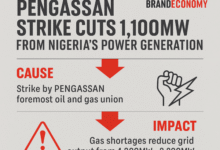Nigeria’s GDP rises by 1.87% in Q1 2020- NBS

The National Bureau of Statistics (NBS) has revealed that Nigeria’s Gross Domestic Product grew by 1.87 per cent (year-on-year) in real terms in the first quarter of 2020.
The NBS revealed this in ‘Nigeria’s Gross Domestic Product’ report for first quarter 2020 on Monday.
This performance was recorded against the backdrop of significant global disruptions resulting from the COVID-19 public health crisis, a sharp fall in oil prices, and restricted international trade.
The performance recorded in Q1 2020 represents a drop of –0.23 per cent points compared to Q1 2019 and –0.68 per cent points compared to Q4 2019, reflecting the earliest effects of the disruption, particularly on the non-oil economy.
Quarter on quarter, real GDP growth was –14.27 per cent compared to 5.59 per cent recorded in the preceding quarter.
In the quarter under review, aggregate GDP stood at N35.64m in nominal terms.
This performance was higher when compared to the first quarter of 2019 which recorded N31.82m, with a nominal growth rate of 12.01 per cent year on year.
READ ALSO: Over 82.9 Million Nigerians Live In Poverty – NBS
Relative to the first quarter of 2019, the nominal growth rate was higher by 0.11 per cent points but lower than the proceeding quarter by –0.32 per cent points.
During the first quarter of 2020, an average daily oil production of 2.07 million barrels per day (mbpd) was recorded.
The production level was higher than the 1.99mbpd recorded in the same quarter of 2019 by 0.08mbpd and the fourth quarter of 2019 by 0.06mbpd.
The oil sector recorded a real growth rate of 5.06 per cent (year-on-year) in Q1 2020 indicating an increase of 6.51 per cent points relative to the rate recorded in the corresponding quarter of 2019.
However, growth decreased by –1.30 per cent points when compared to Q4 2019 which was 6.36 per cent.
Quarter-on-quarter, the oil sector recorded a growth rate of 11.30 per cent in Q1 2020.
The oil sector contributed 9.50 per cent to aggregate real GDP in Q1 2020, up from figures recorded in the corresponding period of 2019 and the preceding quarter, as the share of the non-oil economy declined.
Yetunde Adegoke











